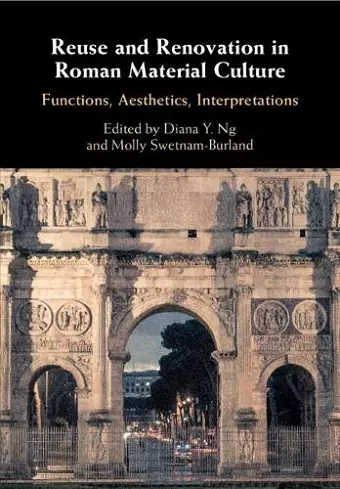Reuse and Renovation in Roman Material Culture
Functions, Aesthetics, Interpretations
Diana Y Ng editor Molly Swetnam-Burland editor
Format:Hardback
Publisher:Cambridge University Press
Published:6th Sep '18
Currently unavailable, and unfortunately no date known when it will be back
This hardback is available in another edition too:
- Paperback£30.99(9781108461702)

The reuse of architectural and sculptural materials (spoliation) was common centuries earlier than previously realized, during the Roman empire.
This book is for those interested in the Roman world. It treats the reuse of sculptural and architectural materials in new contexts, and explores the new associations that these 'out of place' materials created for their viewers. Materials were sometimes used to create new meanings, and sometimes for economic expedience.This book explores the spoliation of architectural and sculptural materials during the Roman empire. Examining a wide range of materials, including imperial portraits, statues associated with master craftsmen, architectural moldings and fixtures, tombs and sarcophagi, arches and gateways, it demonstrates that secondary intervention was common well before Late Antiquity, in fact, centuries earlier than has been previously acknowledged. The essays in this volume, written by a team of international experts, collectively argue that reuse was a natural feature of human manipulation of the physical environment, rather than a sign of social pressure. Reuse often reflected appreciation for the function, form, and design of the material culture of earlier eras. Political, social, religious, and economic factors also contributed to the practice. A comprehensive overview of spoliation and reuse, this volume examines the phenomenon in Rome and throughout the Mediterranean world.
'Throughout, the volume is impressively well illustrated. It is wide ranging, informative, challenging and thought provoking. It is one of the best edited volumes I have read for some time. While each paper has a specific aim, sight of the bigger picture and wider context is never lost. Moreover, the fact that the papers communicate with each other throughout the volume is indicative of both careful editing and collaborative participation by the contributors in the overall process. The success of this volume means that there is good scope to broaden the contributions to include extra-urban regions and more provinces in future endeavours.' Rebecca J. Sweetman, The Journal of Roman Studies
ISBN: 9781108473897
Dimensions: 261mm x 185mm x 18mm
Weight: 790g
288 pages